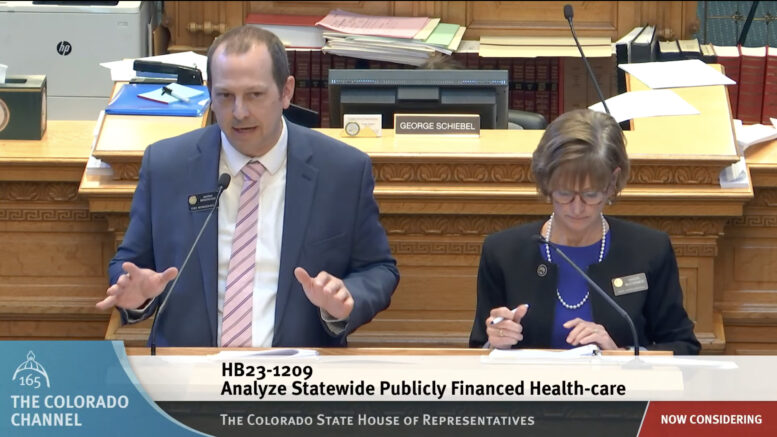During Gov. Jared Polis’ first term, Colorado legislators passed significant health-care reform in areas ranging from prescription-drug pricing to lower-cost insurance offerings.
Now, in the first year of his second term, they are looking already to expand some of those programs, even before they’ve been able to implement the original plans fully. And in the case of at least one bill, they are hoping to study an idea that could end up wiping out one of the early, signature programs.
Supporters of the new changes said they are hoping to remove some handcuffs originally placed on the reform efforts in order to allow them to work better — and to study whether even bolder ideas could bring bigger gains to the state. Opponents like insurers and Republican legislators are questioning, however, whether it’s wise to double down on these initiatives before seeing whether they’ll achieve some of the benefits that supporters predicted — or some of the drawbacks that opponents worry will arise.
Among the myriad health-care bills that are moving through the legislative process, three are interconnected in this way:
- House Bill 1225 would remove the limit on the number of pharmaceuticals that the Prescription Drug Affordability Board can study to determine whether their prices should be capped and would extend the life of the board from September 2026 to September 2031;
- HB 1224 would allow the state to make more prominent on its healthcare exchange the Colorado Option plans that health insurers are required to offer with lower premiums, so that consumers may give extra consideration to purchasing them; and,
- HB 1209 would pay the Colorado School of Public Health to study the efficacy of a government-funded and privately provided single-payer health-care system that would be the first of its kind in the country and would eliminate reforms like the Colorado Option.
A desire to cut healthcare costs
Proponents say the three bills share the goal of reducing healthcare costs that now force consumers at times to choose between paying for medical necessities or for other expenses. And they argue that the limitations in state law now prevent each idea from achieving its maximum level of impact.
“A lot of these prescription drugs save lives. While we are trying to provide these life-saving drugs, people are struggling to pay for their health care,” Rep. Chris deGruy Kennedy, the Lakewood Democrat cosponsoring HB 1225, explained to the House Health and Insurance Committee last month about his efforts to expand that nascent law. “Pharmaceutical prices are particularly difficult, because these are not companies based in Colorado and there are limits to what a state legislature can do.”
Polis in 2021 signed the PDAB into law with the power to set upper payment limits on prescription drugs, but with a provision that the board could cap prices on only 12 drugs by late 2026, when it either must be extended by the Legislature or repealed. DeGruy Kennedy said the 12-drug limit, which was added in the Senate two years ago because of “complicated dynamics” around trying to pass the bill, are stifling, and supporters like the Colorado Center on Law and Policy have noted that there are 12 versions alone of some particularly popular drugs.
Concern about stifling healthcare investment
But Amy Goodman, vice president of policy and advocacy for the Colorado Bioscience Association, argued that the threat of unlimited price caps will cripple companies’ ability to raise money from investors that is critical for bringing the drugs to market in the first place. And Adam Burg, vice president of government affairs for the Denver Metro Chamber of Commerce, said it’s premature to expand a law whose benefits and detriments remain unknown.
“The board has not completed an affordability review or set an upper payment limit for a single drug,” Burg said last month of the bill, which is scheduled for its next hearing Wednesday afternoon in the Senate Health and Human Services Committee. “We have not yet seen how PDAB will play out for patients or the life-sciences system.”
Skeptics are making similar arguments regarding HB 1224, which has passed the House and could come up for Senate debate as soon as this week. In this case, though, they argue that the bill, which would require the Colorado health-benefit exchange to develop a format for displaying prominently the Colorado Option plans sold on it, would seek to boost a program whose short track record shows it to be a failure.
Colorado’s Health Care Future, a group critical of the effects of standardized low-cost plans on both insurers and providers forced to take lower reimbursement, commissioned a study from actuarial consulting firm NovaRest that found that non-Colorado Option plans are the lowest-cost options on the exchange in 60 of the state’s 64 counties. Colorado Association of Health Plans Associate Director Brandon Arnold said in an interview that the bill would allow the state to put its thumb on the scale to tip business to the plans at the detriment of other plans that are attempting to compete on the free market.
“A vast margin of people still shopped on the exchange and found greater value in traditional, non-option plans,” Arnold said, noting that just 13% of exchange customers selected Colorado Option plans during open enrollment at the end of 2022 and beginning of this year. “So rather than giving the Colorado Option a fair shake, the (Colorado) Division (of Insurance) is deciding what the preferred option is.”
Healthcare bills seek to expand reform
Kate Harris, chief deputy commissioner of life and health policy at the state insurance division, told a committee last month that officials considered the Colorado Option plans a big success, given that similar plans in the state of Washington accounted for 1% of sales in their first year. HB 1224 would allow the state to highlight those plans to the many people who may not have known of them.
“The intent there is to recognize that for so many Coloradans, these are high-quality, high-value plans that will work better for them,” Harris said.
All that promotion would be for naught if the state were eventually to go to a government-paid insurance system like what is seen in Canada or European countries, admitted Rep. Andy Boesenecker, D-Fort Collins. Still, Boesenecker is cosponsoring HB 1209, which received preliminary approval from the House on Monday, because he believes it’s imperative to study whether such a health-care system could create massive savings for state residents.

Colorado state Rep. Andy Boesenecker speaks to the Colorado Chamber of Commerce Health Policy Council in March 2023.
Under the current version of the bill, CSPH would have until October 2024 to put together a study of single-payer systems in conjunction with an appointed task force and then to get a report back to the Legislature. While the state has studied the issue from a high level twice before, this deep dive would examine issues including such a system’s impact on health-care facilities and providers, on insurance companies and on the development of specialty prescription drugs.
“Asking hard questions”
“My hope with the study is to actually pull in diverse stakeholders to feel that they were at the table,” Boesenecker told the Colorado Chamber of Commerce’s Health Policy Council during its March meeting. “I think ultimately what we need to do is pull together a group of people on the policy and start asking hard questions on it.”
Objections run the gamut, from insurance organizations questioning whether such a policy would lead to an exodus of providers from the state and a debilitating impact on Colorado’s health-care system to Rep. Matt Soper, R-Delta, saying the state has studied the issue enough and arguing this would be a waste of $300,000.
Rep. Rick Taggart, R-Grand Junction, echoed complaints about the other two bills Monday, asking why legislators would want to examine gutting the health-care reforms the state has spent the past four years making even before seeing whether they achieve their intended aims.
“I’m worried that we have a cart-before-the-horse situation,” Taggart said. “We’re making a jump and we’re stepping over a critical analysis. And that analysis is: Those public options that are available today, are they effective?”
